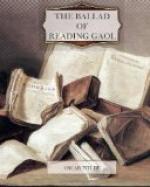And I will tell thee why the jacinth wears
Such dread embroidery of dolorous moan,
And why the hapless nightingale forbears
To sing her song at noon, but weeps alone
When the fleet swallow sleeps, and rich men feast,
And why the laurel trembles when she sees the lightening
east.
And I will sing how sad Proserpina
Unto a grave and gloomy Lord was wed,
And lure the silver-breasted Helena
Back from the lotus meadows of the dead,
So shalt thou see that awful loveliness
For which two mighty Hosts met fearfully in war’s
abyss!
And then I’ll pipe to thee that Grecian tale
How Cynthia loves the lad Endymion,
And hidden in a grey and misty veil
Hies to the cliffs of Latmos once the Sun
Leaps from his ocean bed in fruitless chase
Of those pale flying feet which fade away in his embrace.
And if my flute can breathe sweet melody,
We may behold Her face who long ago
Dwelt among men by the AEgean sea,
And whose sad house with pillaged portico
And friezeless wall and columns toppled down
Looms o’er the ruins of that fair and violet
cinctured town.
Spirit of Beauty! tarry still awhile,
They are not dead, thine ancient votaries;
Some few there are to whom thy radiant smile
Is better than a thousand victories,
Though all the nobly slain of Waterloo
Rise up in wrath against them! tarry still, there
are a few
Who for thy sake would give their manlihood
And consecrate their being; I at least
Have done so, made thy lips my daily food,
And in thy temples found a goodlier feast
Than this starved age can give me, spite of all
Its new-found creeds so sceptical and so dogmatical.
Here not Cephissos, not Ilissos flows,
The woods of white Colonos are not here,
On our bleak hills the olive never blows,
No simple priest conducts his lowing steer
Up the steep marble way, nor through the town
Do laughing maidens bear to thee the crocus-flowered
gown.
Yet tarry! for the boy who loved thee best,
Whose very name should be a memory
To make thee linger, sleeps in silent rest
Beneath the Roman walls, and melody
Still mourns her sweetest lyre; none can play
The lute of Adonais: with his lips Song passed
away.
Nay, when Keats died the Muses still had left
One silver voice to sing his threnody,
But ah! too soon of it we were bereft
When on that riven night and stormy sea
Panthea claimed her singer as her own,
And slew the mouth that praised her; since which time
we walk
alone,
Save for that fiery heart, that morning star
Of re-arisen England, whose clear eye
Saw from our tottering throne and waste of war
The grand Greek limbs of young Democracy
Rise mightily like Hesperus and bring
The great Republic! him at least thy love hath taught
to sing,
And he hath been with thee at Thessaly,
And seen white Atalanta fleet of foot
In passionless and fierce virginity
Hunting the tusked boar, his honied lute
Hath pierced the cavern of the hollow hill,
And Venus laughs to know one knee will bow before
her still.




